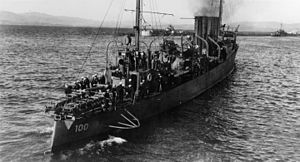USS Maury (DD-100)
 |
|
| History | |
|---|---|
|
|
|
| Namesake: | Matthew Fontaine Maury |
| Builder: | Fore River Shipyard, Quincy, Massachusetts |
| Laid down: | 4 May 1918 |
| Launched: | 4 July 1918 |
| Commissioned: | 23 September 1918 |
| Decommissioned: | 19 March 1930 |
| Reclassified: | 17 July 1920, DM-5 |
| Struck: | 22 October 1930 |
| Fate: | Scrapped, 1 May 1934 |
| General characteristics | |
| Class and type: | Wickes class destroyer |
| Displacement: | 1,199 tons |
| Length: | 314 ft 5 in (95.83 m) |
| Beam: | 31 ft 9 in (9.68 m) |
| Draft: | 9 ft 2 in (2.79 m) |
| Speed: | 35 knots (65 km/h) |
| Complement: | 133 officers and enlisted |
| Armament: | 4 × 4 in (100 mm) guns, 1 × 3 in (76 mm) gun, 12 × 21 inch (533 mm) torpedo tubes |
The first USS Maury (DD-100) was a Wickes-class destroyer in the United States Navy during World War I and the years following. She was named in honor of Matthew Fontaine Maury.
Maury was laid down 4 May 1918 by Fore River Shipbuilding Company, Quincy, Massachusetts; launched 4 July 1918; sponsored by Miss Anna Hamlin; and commissioned 23 September 1918, Lieutenant Commander John H. Newton in command.
Maury, having completed an east coast shakedown, departed New York City 12 November 1918 to escort a convoy bound for France. Detached off the Azores, she proceeded to Gibraltar, arriving on the 26th. She cruised in the western Mediterranean until reporting for duty with the Adriatic Detachment at Venice 18 February 1919. With that squadron for the next 5 months, she participated in their “umpiring” duties as first Rear Admiral Albert Niblack and then Rear Admiral Adolphus Andrews sought to employ their good offices in the political rivalry for the natural harbors of the Adriatic. Primary contenders for this area, particularly Trieste, were Italy and the newly created state of Yugoslavia, itself fraught with internal nationalistic dissension. Secondary postwar problems connected with this duty involved clearing the Adriatic of the multitude of mines which broke away with winds and presented a menace to shipping; distribution of food to the hunger-stricken Balkans; and providing for the ever-growing numbers of refugees.
...
Wikipedia
